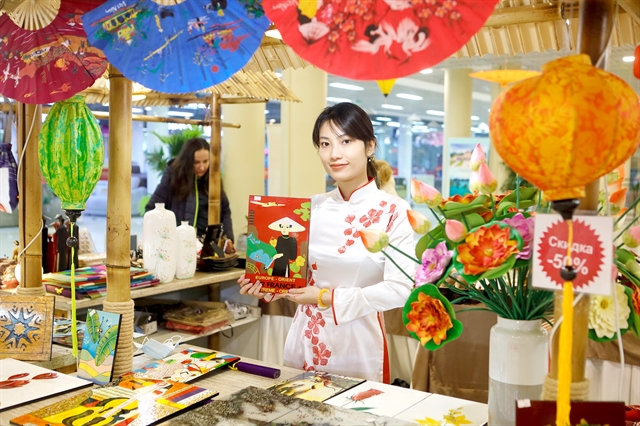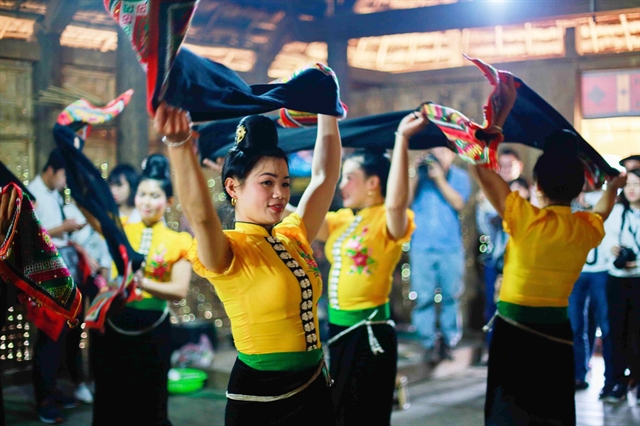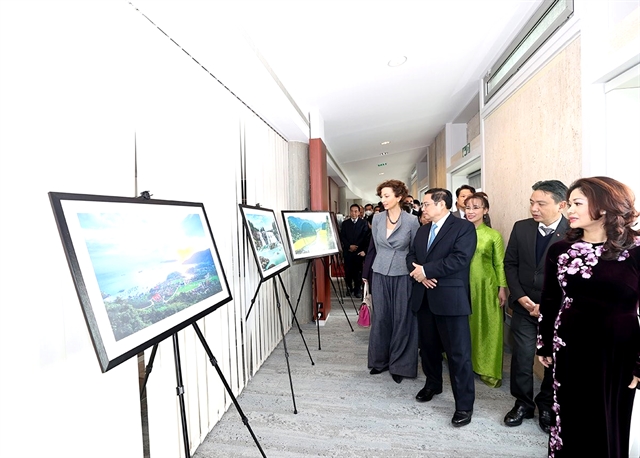Promoting Vietnamese culture essential for international integration

Vietnamese lacquer paintings are introduced at a cultural fair in Moscow, Russia during the Lunar New Year Festival in February 2021. Introducing Vietnamese cultural elements to foreign countries is an important mission of the country's cultural diplomacy. VNA/VNS Photo Trần Hiếu
HÀ NỘI Minister of Foreign Affairs Bùi Thanh Sơn and diplomatic officials have given their thoughts on cultural diplomacy, and the Prime Minister's strategy to showcase Việt Nam's heritage on the world stage.
Culture has always been considered by the Party and State as the motivation for development, the spiritual foundation of society, and the goal and motivation for the country’s sustainable development.
The country’s leaders often stressed that “culture should be put on equal terms with economics and politics”.
This affirmation is a continuation of President Hồ Chí Minh’s thoughts on the pivotal role of culture in society. The late president once said: “Culture lights the way for national advancement.”
In other words, culture is considered one of the deciding factors for the building and development of the country.
Cultural diplomacy refers to international activities that serve to exchange values between nations, bringing forward mutual understanding and laying a foundation for the fulfillment of political, economic, national defence, and security missions.
In the diplomacy strategy of any country around the world, cultural diplomacy is always one of the fundamental, crucial missions and factors that brings national strength and diplomatic identity. In Việt Nam, it is an area that the Party and State pay special attention to, especially after the cultural diplomacy strategy towards 2020 was approved by the then Prime Minister Nguyễn Tấn Dũng in 2011.
Ten years later, on November 30, 2021, six days after the National Cultural Conference was held by the Politburo and the Secretariat of the Party Central Committee, a cultural diplomacy strategy towards 2030 was approved by Prime Minister Phạm Minh Chính.
It sets the goal of integrating culture in diplomatic activities to deepen and stabilise Việt Nam’s relations with other countries, ensure the benefits of the nation and people, create favourable conditions for socio-economic development, and promote the country’s cultural values and beauty.
Strengthen existing achievements
Speaking at a cultural diplomacy conference in Hà Nội in December last year, Minister of Foreign Affairs Bùi Thanh Sơn said cultural diplomatic activities in recent years have made three major achievements. They are: honouring the intellectuality, virtues and ideals of Vietnamese people; promoting the country’s and people’s image through several activities, events and festivals; and taking the Vietnamese cultural values to international standards with campaigns for international titles.
The new cultural diplomacy strategy towards 2030 aims to strengthen and improve these achievements. It specifies the guiding principles of the Party’s 13th National Party Congress on external relations and cultural diplomacy, and sets out to overcome the challenges that Party General Secretary Nguyễn Phú Trọng pointed out in implementing these principles.
One of the challenges is that “culture has not been recognised and paid enough attention to by authorities at different levels as something on an equal footing with economics and politics, and has not really become a motivation and intrinsic force of the country’s sustainable development,” the Party leader once said. “The introduction and promotion of Việt Nam’s culture to the world were not strong enough; the good, unique cultural values of the country have not been appreciated, preserved and protected enough, and for many times obscene, offensive, non-selective adaptation of foreign cultures have been done.”

Women of the Thái ethnic minority in the northern province of Hòa Bình perform their folk dance Xòe Thái. The dance was recognised by UNESCO as an Intangible Cultural Heritage of Humanity in December 2021. VNA/VNS Photo Trọng Đạt
In terms of the cultural diplomacy strategy towards 2030, Minister of Foreign Affairs Sơn said it is a product of collective intelligence, for which many people have been consulted. So it is a fine combination of theory and practice, specificity and generality.
The strategy has clearly defined three things. First, it’s the fundamentals of cultural diplomacy and the two major areas it serves – foreign policy and cultural development policy. Second, it’s the strategy’s target audiences, which are localities, the people, and enterprises. Third, it’s the strategy’s five main missions: to facilitate relations, integrate cultures, promote the country, campaign for international titles, and absorb the quintessential values of humanity.
According to Dr Tạ Ngọc Tấn, vice chairman of the Theoretical Council of the Party’s Central Committee, if culture is a country’s soft power, cultural diplomacy is the pioneering force to exercise that power on a global scale, which will open doors not only for economic and political diplomacy but also for the development of the country's strength beyond national borders.
The cultural diplomacy strategy towards 2030 has provided solutions for these tasks.
Proactive adaptation to new situations
One of the major features of cultural diplomacy in the new period is to proactively adapt and serve the socio-economic development of the country, which centres on localities, the people, and enterprises.
Analysing this important task, Mai Phan Dũng, head of the Department of Cultural Diplomacy and UNESCO under the Ministry of Foreign Affairs, said that cultural diplomacy needs to be closely linked to economic diplomacy in trade and tourism promotion activities. That way, it can further support and promote the export of Vietnamese brands, and create an image of Việt Nam that will not only attract economic cooperation, investment and tourism development, but also express a culture that is unique, perse, friendly, and easy to adapt to and “live in” for investors and foreign workers.
It will also develop the cultural industry into a new motivation for the economy, which will strengthen the country’s soft power, promote its image, and expand export markets for its cultural products, he said.
Dũng added that it’s necessary to integrate the Vietnamese spirit and cultural identity into the practical international cooperation activities and external relation affairs of each ministry, sector, and locality. The country also needs to actively participate in regional and international organisations and forums such as UNESCO, ASEAN, and the Forum for East Asia-Latin America Cooperation (FEALAC) for cultural exchange, cooperation, and promotion of the country’s image, people and culture.

Prime Minister Phạm Minh Chính (third from right), in front) visits UNESCO headquarters in Paris, France in November 2021. VNA/VNS Photo Dương Giang
Vũ Bá Phú, director general of the Vietnam Trade Promotion Agency (under the Ministry of Industry and Trade), stressed the need for promoting Vietnamese products in diplomatic activities. This helps to promote trade, connect producers, increase the products’ values and their competitive capacity in the market.
He said: “The efforts to promote national products and brands at diplomatic and cultural diplomatic events have helped to increase Việt Nam’s national brand value. It remained at the 33rd position in the top 100 strongest national brands in the world in 2021.”
Vietnamese Ambassador to Japan Vũ Hồng Nam cited the 2017 visit of the former Japanese Prime Minister, Abe Shinzo, to Việt Nam as a cultural diplomatic highlight. On that trip, PM Shinzo was invited by President Nguyễn Xuân Phúc, who was then Prime Minister of Việt Nam, to try Quảng noodles – a signature dish of the central province of Quảng Nam – which he spoke about everywhere he went afterwards.
From that experience, Nam expressed his hopes that the Vietnamese diplomatic agencies will further introduce the Vietnamese cultural elements to the countries where they are based, from decorative items to restaurants and culinary specialities.
As the country enters a new period of development after the 13th National Party Congress, cultural diplomacy, together with political and economic diplomacy, will continue to make essential contributions to the country’s peace, stability and growth.
In the future it will also take on the mission of igniting and maximising the potential and strength of Vietnamese culture, said Foreign Minister Sơn, so that culture will truly become an intrinsic power that attracts external resources. A comprehensive implementation of cultural diplomacy will be an important component of a modern, inclusive Vietnamese diplomacy, he said. VNS
Related News

Việt Nam affirms position in international integration
15:21 | 09/01/2023 Headlines

Requirements of businesses in integration are a driving force for the digital transformation of the Finance sector
17:27 | 31/10/2022 Finance

Integration into ASEAN - stepping stone for Vietnam’s int’l economic integration
18:35 | 05/08/2022 Headlines

The deeper the integration, the greater the difficulty in HR for logistics
19:45 | 20/12/2021 Import-Export
Latest News

Australian Governor-General wraps up State visit to Vietnam
13:53 | 06/04/2023 Headlines

Vietnam active at UN Human Rights Council’s 52nd session
16:11 | 05/04/2023 Headlines

Vietnam commits to building prosperous, fair, healthy Mekong River basin: PM
16:09 | 05/04/2023 Headlines

Việt Nam, US hold 12th political, security, defence dialogue
14:15 | 03/04/2023 Headlines
More News

Private sector remains driving force for economy
14:11 | 03/04/2023 Headlines

State visit to Vietnam by Australian Governor-General to deepen the two’s goodwill, trust: expert
14:10 | 03/04/2023 Headlines

Vietnam"s economy to grow by 6.6% this year: OECD
17:45 | 02/04/2023 Headlines

Bright outlook for Vietnamese tourism in new situation
16:52 | 02/04/2023 Headlines

Vietnam, US hold 12th Political, Security, Defence Dialogue
20:25 | 01/04/2023 Headlines

Vietnam calls for comprehensive, all-society approach to waste management
14:32 | 31/03/2023 Headlines

Many factors support foreign capital flow
13:40 | 30/03/2023 Headlines

Foreign SMEs pour capital into Vietnam
13:37 | 30/03/2023 Headlines

Leaders of aviation firms to be disciplined if employees committed wrongdoings
15:38 | 29/03/2023 Headlines
Your care
The system has not recorded your reading habits.
Please Login/Register so that the system can provide articles according to your reading needs.

Australian Governor-General wraps up State visit to Vietnam
13:53 | 06/04/2023 Headlines

Vietnam active at UN Human Rights Council’s 52nd session
16:11 | 05/04/2023 Headlines

Vietnam commits to building prosperous, fair, healthy Mekong River basin: PM
16:09 | 05/04/2023 Headlines

Việt Nam, US hold 12th political, security, defence dialogue
14:15 | 03/04/2023 Headlines

Private sector remains driving force for economy
14:11 | 03/04/2023 Headlines
